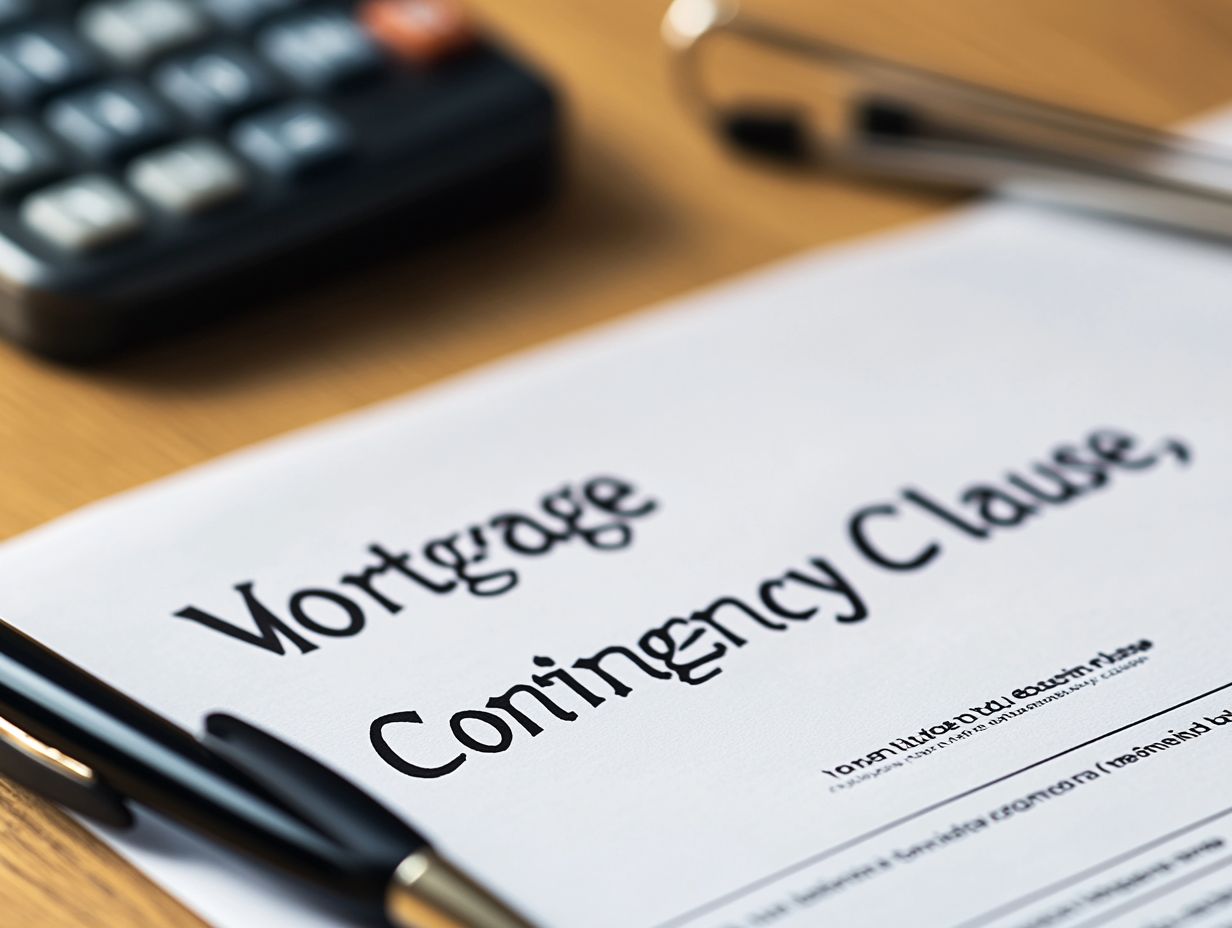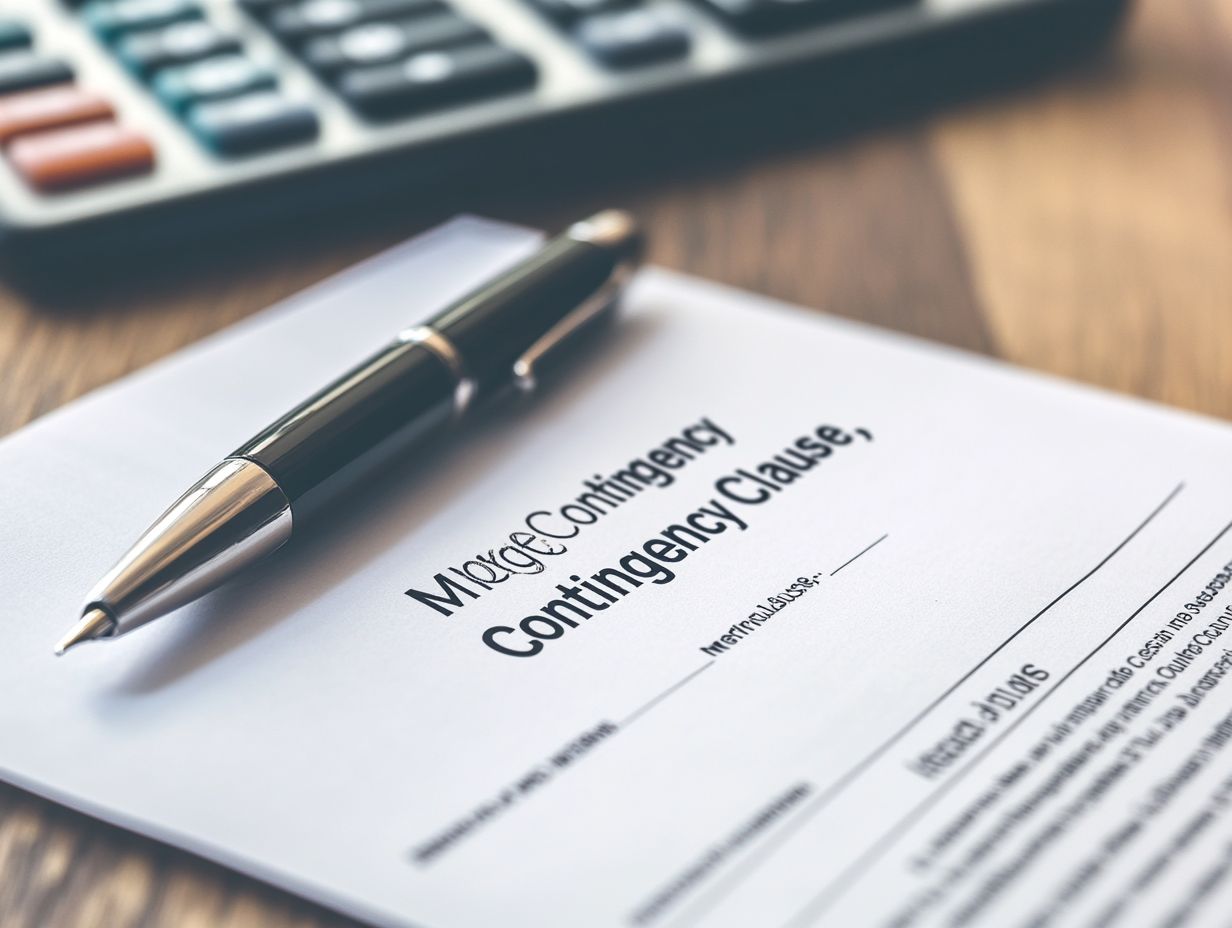What Is a Mortgage Contingency Clause?
Navigating the world of real estate can be a complex endeavor, particularly when it comes to financing a home. One essential element to grasp is the mortgage contingency clause a protective measure that can significantly influence the outcome of a deal for both buyers and sellers.
This guide delves into the definition and purpose of mortgage contingency clauses, shedding light on how they function. You’ll discover their benefits, the potential risks of omitting them, and effective negotiation strategies. We will also address common misconceptions surrounding these clauses.
Whether you re stepping into the market for the first time or simply seeking to expand your knowledge, this guide will empower you with the insights you need to succeed!
Contents
- Key Takeaways:
- Understanding Mortgage Contingency Clauses
- How Mortgage Contingency Clauses Work
- Benefits of Including a Mortgage Contingency Clause
- Potential Risks of Not Including a Mortgage Contingency Clause
- Negotiating a Mortgage Contingency Clause
- Common Misconceptions About Mortgage Contingency Clauses
- Frequently Asked Questions
- What Is a Mortgage Contingency Clause?
- What are the typical conditions in a mortgage contingency clause?
- What if my real estate contract doesn t have a mortgage contingency clause?
- What happens if a buyer can t secure financing within the specified timeline?
- Can a seller include their own conditions in a mortgage contingency clause?
- Is a mortgage contingency clause the same as a financing contingency?
Key Takeaways:

A mortgage contingency clause is a provision in a real estate contract that allows the buyer to back out of the agreement if they are unable to secure a mortgage within a specified timeframe. Including a mortgage contingency clause can provide protection for both buyers and sellers, ensuring a smooth and fair transaction.
It is important for buyers and sellers to carefully negotiate the terms of this clause and understand the potential risks involved in not including one in the contract.
Understanding Mortgage Contingency Clauses
Mortgage contingency clauses are crucial in real estate transactions. They act as safeguards for both buyers and sellers in the nuanced world of home purchasing agreements.
These clauses outline the specific conditions that must be fulfilled before a buyer is bound to finalize the purchase, often concerning mortgage financing, appraisal values, and inspection results.
Understanding these clauses is crucial; missing out could cost you financially!
They make sure the buyer’s finances match the sale conditions while also reducing the risks tied to property transactions.
Definition and Purpose
A mortgage contingency clause is a key element in a real estate contract, outlining conditions that allow you to back out of a purchase without penalty, primarily concerning financing and appraisal requirements.
This clause acts as a vital safety net, ensuring you aren t tied to a commitment you can t afford, especially if your lender doesn t approve the loan or if the property appraisal falls short of the expected value.
Common conditions you might encounter include:
- A timeframe for securing financing,
- The necessity of a satisfactory property appraisal,
- The requirement for a loan commitment letter (a document from your lender stating that they are willing to give you a loan, provided you meet certain conditions).
By integrating these terms, you can shield yourself from potential financial strain, making the mortgage contingency clause an essential part of your home-buying journey.
How Mortgage Contingency Clauses Work
Mortgage contingency clauses function by setting forth explicit conditions that must be met for a real estate transaction to move forward, offering a safeguard for both buyers and sellers in the closing process.
These conditions often encompass securing financing, successfully completing requisite inspections, and obtaining favorable property appraisals.
Conditions and Timelines
Conditions and timelines outlined in your mortgage contingency clause are essential components that define your responsibilities when securing financing and conducting necessary inspections and appraisals for the property.
These stipulations typically require you to obtain formal financing approvals by a specified deadline. This ensures you have the necessary funds to complete your purchase.
The clause may also dictate that you arrange for home inspections and appraisals within a set timeframe, helping to identify any potential issues with the property early on.
If these conditions aren t met within the designated periods, you maintain the right to negotiate, request repairs, or even withdraw from the agreement without penalty, thereby protecting your interests throughout the transaction.
Ready to dive into your home-buying journey? Let s get started today!
Benefits of Including a Mortgage Contingency Clause

Including a mortgage contingency clause in a real estate agreement brings substantial advantages for both buyers and sellers. This clause acts as a vital safety net in property deals.
For buyers, this clause offers essential protection against unexpected financial challenges during the home purchasing journey, such as issues in securing a loan or receiving an unfavorable appraisal. This safeguard ensures you can navigate the complexities of the market with confidence and peace of mind.
Protection for Buyers and Sellers
The primary protection offered by mortgage contingency clauses allows you to navigate the complexities of real estate transactions with confidence and security. This helps you protect your finances.
These clauses address potential risks during the buying and selling process. If you cannot secure necessary financing, the contingency grants you the freedom to walk away without incurring financial penalties, thus safeguarding your investment.
Sellers also benefit, as these clauses establish conditions that prevent the property from slipping through the cracks due to appraisal discrepancies or disappointing inspection results. Sellers retain the right to renegotiate or withdraw if the property valuation falls short of expectations.
This strategic safety net fosters a balanced environment, alleviating concerns over unexpected costs and reinforcing trust between both parties.
Potential Risks of Not Including a Mortgage Contingency Clause
Failing to include a mortgage contingency clause in a real estate contract puts both buyers and sellers at serious risk, potentially resulting in severe financial and legal repercussions.
For buyers, not having this clause means you might commit to a home purchase without the necessary financing. Sellers can face significant complications if a buyer is unable to secure a mortgage, leading to possible breaches of contract.
Possible Consequences for Buyers and Sellers
Neglecting to include a mortgage contingency clause can lead to serious repercussions for both buyers and sellers, often resulting in financial losses and potential legal entanglements.
For buyers, skipping this crucial clause means risking your earnest money deposit if you can t secure financing, as the seller may interpret this as a breach of contract.
On the flip side, sellers could find themselves liable if they misrepresented the property’s value or failed to disclose essential financial information, leading to disputes that could delay the closing process.
Without a solid grasp of contingencies, both parties risk significant delays, unexpected costs, and contentious negotiations, all of which could derail the entire transaction.
Negotiating a Mortgage Contingency Clause
Negotiating a mortgage contingency clause is crucial for successful real estate deals, where you whether as a buyer or seller strive to create terms that suit your financial circumstances and expectations.
This negotiation process involves thorough discussions of several key elements within the clause, including specific conditions, timelines for securing financing, and any potential extensions that might be required.
Tips for Buyers and Sellers

- Communicate openly about your needs and expectations for a collaborative environment.
- As a buyer, familiarize yourself with current market conditions to present solid offers reflecting prevailing interest rates and housing trends.
- As a seller, understand what appeals to buyers and express your willingness to compromise on certain terms to close the deal.
- Engage in active listening and maintain a flexible approach to navigate negotiations effectively.
Take these steps seriously to enhance your real estate experience and secure the best possible terms. For further assistance, consult a real estate expert today!
Common Misconceptions About Mortgage Contingency Clauses
You may encounter several common misconceptions about mortgage contingency clauses. These misunderstandings can create confusion for both buyers and sellers in real estate transactions, affecting their grasp of financing and property agreements.
Many individuals think that these clauses only benefit buyers. However, they protect both parties by clearly outlining the terms related to appraisal, inspection, and financing.
Understanding this mutual benefit is essential for navigating the complexities of real estate deals.
Clarifying Misunderstandings
Clarifying misunderstandings about mortgage contingency clauses is crucial. This knowledge enables both buyers and sellers to make informed decisions during real estate transactions.
These clauses act as a safety net, allowing you to back out of a deal without penalty if the bank says no to your loan. However, some mistakenly believe these contingencies guarantee approval, creating unrealistic expectations.
Others may think they re not required to secure financing by a specific date. This misconception can inadvertently slow down the entire process. By gaining a clear understanding of the purpose and stipulations of these clauses, you can avoid potential pitfalls and facilitate smoother negotiations. Ultimately, this paves the way for a successful home purchase.
Frequently Asked Questions
What Is a Mortgage Contingency Clause?
A mortgage contingency clause is a part of a real estate contract. It outlines specific conditions that must be met for the buyer to secure financing for the property. Think of it as your safety net when you’re buying a home!
What are the typical conditions in a mortgage contingency clause?

The conditions outlined in a mortgage contingency clause can vary, but they usually include the loan amount, interest rate, and type of loan the buyer is seeking. A specific timeline for securing financing is often included as well.
What if my real estate contract doesn t have a mortgage contingency clause?
No, not all real estate contracts include a mortgage contingency clause. It is up to the buyer and seller to negotiate and decide whether to include this clause in the contract.
What happens if a buyer can t secure financing within the specified timeline?
If the buyer can’t secure financing within the specified timeline, the contract may be terminated. In this case, the buyer can back out of the purchase without penalty, but this also depends on the specific language in the clause.
Can a seller include their own conditions in a mortgage contingency clause?
Yes, a seller can include their own conditions. For example, they may ask the buyer to provide proof of mortgage pre-approval or to use a specific lender.
Is a mortgage contingency clause the same as a financing contingency?
Yes, a mortgage contingency clause is often referred to as a financing contingency. Both serve the same purpose: protecting the buyer if they can’t secure financing for the property purchase.






